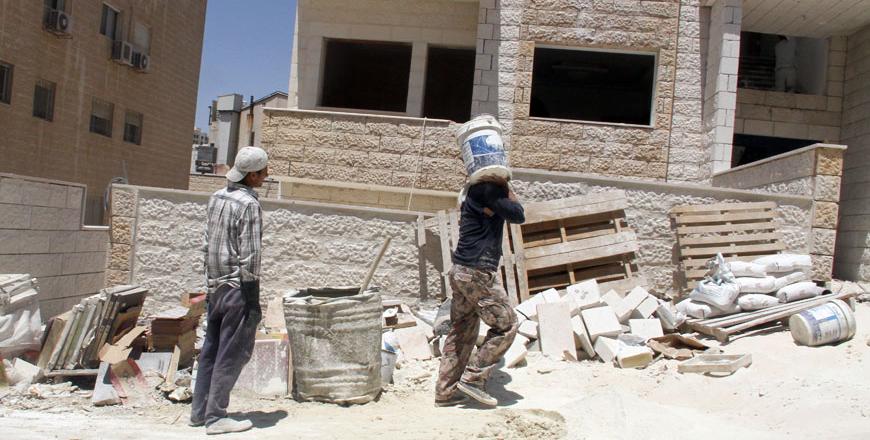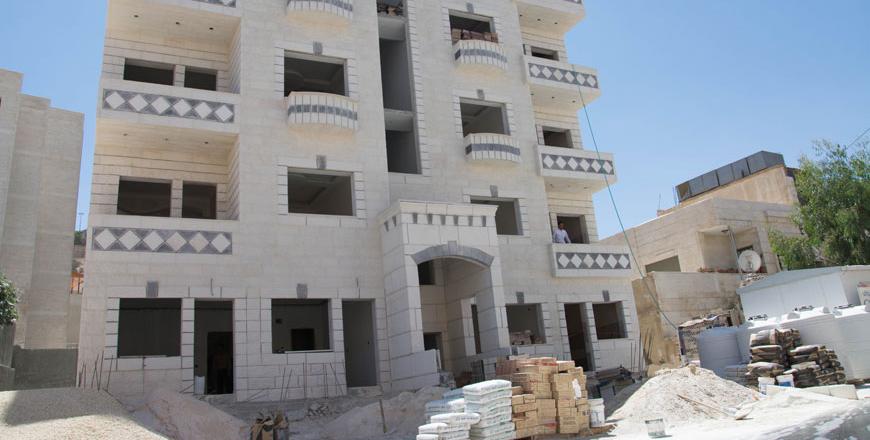You are here
Drop in apartment prices expected due to fee exemptions
By Omar Obeidat - Jul 23,2015 - Last updated at Jul 23,2015

Workers are seen at a construction site in Amman on Thursday (Photo by Osama Aqarbeh)
AMMAN – Prices of residential apartments are expected to go down after a government decision to give buyers exemptions from registration fees, Jordan Housing Developers Association (JHDA) President Kamal Awamleh said Thursday.
On Wednesday, the government announced a package of incentives to stimulate the real estate sector that exempts homebuyers from registration fees for the first 150 square metres (sq.m.) of apartments sized 180sq.m. or less.
For any apartment that exceeds 180sq.m., buyers will pay the registration fees without exemptions, according to the decision announced by Prime Minister Abdullah Ensour at a press conference.
The incentives will be valid until the end of this year.
Awamleh, who described the incentives as good news for both investors and buyers, explained that demand for residential apartments will pick up and supply by homebuilders will also surge.
"Middle-class Jordanians will benefit the most from the decision as they represent the majority of buyers," he noted.
Muhannad Abu Al Hija, a government employee, has been looking for an apartment to buy for weeks.
Now, Abu Al Hija said he can save a few thousands of dinars he will now use to expend on his wedding in September.
"Finally the government is not trying to take more money from the people," he said, referring to previous decisions to increase taxes.
Awamleh told The Jordan Times that the decision coincided with agreements reached between housing investors and the Greater Amman Municipality (GAM) to speed up licensing and registration measures for projects, adding that delays by GAM used to cause financial losses for housing companies.
The real estate sector has been witnessing a slowdown due to GAM measures and lack of incentives, Awamleh noted, adding that a shortfall in housing units was forecast for this year due to investors’ reluctance to invest in new projects.
According to Awamleh, prices of apartments could go down between 5 and 15 per cent due to incentives as well as a drop in the cost of steel, energy and transportation.
“Sales of apartments will pick up and the sector would make up for the slowdown seen in the first half of the year,” he said.
During the first six months of 2015 trading in the real estate sector saw an 11 per cent drop to JD3.42 billion from JD3.84 billion recorded during the same period of 2014.
In June alone, real estate trading dropped by 18 per cent to JD595 million from JD727 million in June 2014, according Department of Lands and Survey (DLS) figures.
As a result of the decline, government revenues during the January-June period declined by 13 per cent, standing at JD182.7 million compared with JD209.7 million collected in the same period of the previous year.
However, Awamleh said that trading in the property market this year is expected to be lower by JD1 billion than 2014.
Real estate trading last year registered a record JD7.76 billion, 22 per cent higher than the amount in 2013 (JD6.34 billion).
In its annual report, DLS said 105,643 real estate transactions were registered in 2014.
As the government decisions will be valid until the end of the year, Awamleh said investors will lobby to convince the government to extend the incentives period for the coming years as the sector contributes to the economic activity of some other 40 sectors, which he said would boost the performance of the Kingdom’s economy.
The government package also includes exempting non-Jordanian investors with stumbling investments from fines.
Related Articles
AMMAN – Sales of residential apartments jumped sharply in August as government incentives spurred homebuyers' spending, helping the sector e
Trading in the Kingdom’s real estate market surged by 15 per cent from JD5.6 billion in 2012 to JD6.3 billion in 2013, official figures showed Sunday.
AMMAN — No decision has been taken yet on whether to extend a deadline for incentives granted to first-time homebuyers that ends by November













